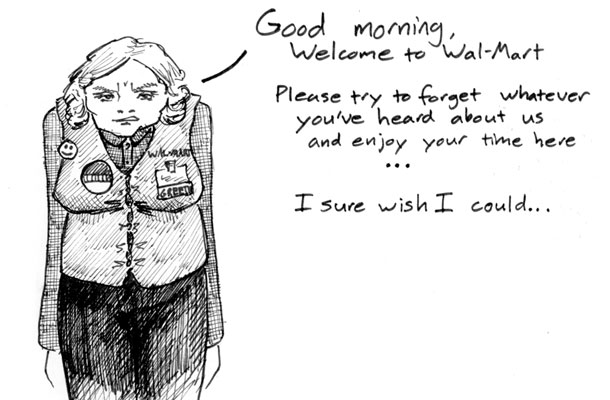Like many college students, I do a lot of shopping at Wal-Mart. Also like many college students, I usually feel pretty bad about it. The controversies for the store speak for themselves: there’s the argument that Wal-Mart’s lower prices run out small-time businesses, thereby making Wal-Mart a larger and larger corporation. As South Park famously parodied them, eventually, if Wal-Mart keeps beating the competition, there will only be Wal-Mart left. Then there’s the smaller controversies, the things you hear about in the news that quickly fade away. Some of the wood for the furniture sold at Wal-Mart is logged in protected Russian habitats for Siberian tigers and other wildlife. Though Wal-Mart promised to stop using the wood, they refused to do so before 2013. There’s also the allegations in the 90s that Wal-Mart was using sweat shops and prison labor overseas to make its products.

Most of the time when Wal-Mart is in the news, it’s for some controversial action of theirs or another. So I wasn’t surprised when I read that Wal-Mart is currently before the Supreme Court because the biggest employment discrimination class action lawsuit in history was being taken against them. This time, the suit had nothing to do with sweatshops, Siberian tigers or small businesses. Instead, the women employees of Wal-Mart have banded together to sue Wal-Mart for discrimination.
The women say on average, they make $1.16 less than men in the same job, even in cases where they have more seniority, higher performance rates and lower turnover rates. They say that despite the fact that women make up 65 percent of the lower-level workforce, they make up only 33 percent of the management employees. Women are told to doll themselves up and wear make-up to work. On Tuesday, their lawyer Joseph Sellers told the Supreme Court that in the training manual for managerial positions, there was a section with the question: “Why are women so unrepresented …. in management?” The official response to this question? “Because men seek advancement, are more aggressive in seeking advancement.”
Wal-Mart’s defense to these allegations seems to be two statements. One, the class action lawsuit is too large with conflicting claims to reflect the feelings of all the women of Wal-Mart. Two, Wal-Mart has an anti-discriminatory policy in place, so how could they be discriminating?
The first statement’s a smart one. It suggests that Wal-Mart would like to sweep the issue under the carpet and talk about the legality of the allegations rather than face these allegations head on, as they have since 2001 when the original suit was filed. But class action lawsuits traditionally involve a mass group of people, many of whom have different tales of their own experience.
In March 2008, for example, Starbucks baristas filed a class action lawsuit against the company for a policy which allowed managers to take a share of the tips they received. Starbucks was forced to pay over $100 million in that case. Each employee no doubt each came into that suit with their own reasons, yet the case proceeded.
Clearly, the issue of discrimination at the company is there, or there wouldn’t be so many women in the class action lawsuit. The women’s side estimates that there are 500,000 employees that are a part of the lawsuit. Wal-Mart estimates the number at closer to 1.5 million. Even in Wal-Mart’s larger number, no matter how widespread those claims are, the issue remains that their policies are discriminatory. The training manual’s assumption about males being more aggressive toward achievement alone should tell you that there is a company-wide problem with sexism.
Unfortunately for Wal-Mart, but fortunate for all the justice-loving people of the world, one of the Supreme Court justices just happens to be Ruth Bader Ginsburg, a woman who, early in her career, represented many victims of sex discrimination in the 1970s. She argued six cases before the Supreme Court, winning five of them.
In response to the claims that the class action lawsuit was too large, with too many varied claims to be taken as a valid lawsuit, Ginsburg asked if Wal-Mart has a responsibility to act if it “gets reports month after month showing that women are disproportionately passed over for promotion and there is a pay gap between men and women doing the same job.”
The answer, I think, has to be a resounding yes.
The second part of Wal-Mart’s defense, that Wal-Mart has an anti-discriminatory policy in place and that it promotes diversity, doesn’t mean a thing to me. A policy only works if it’s enforced and the very existence of this case shows that in this case, it wasn’t.
I’m going to think twice next time I think about shopping at Wal-Mart. Siberian tigers is one thing, but weakening class action lawsuits in the future and discrimination of women is quite another.


























